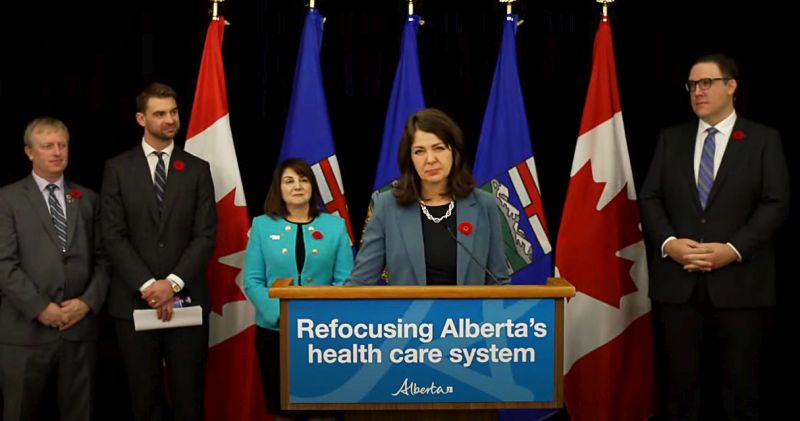On the morning of November 8, Premier Danielle Smith, flanked by Adriana Lagrange (Minister of
Health), Dan Williams (Minister of Mental Health and Addiction), Jason Nixon (Minister of Seniors
Community and Social Services) and MLA Martin Long (Parliamentary Secretary for Rural Health), held a
press conference to share her government’s vision for Alberta’s healthcare system.
Also part of the announcement were past Premier Ed Stelmach (Board Chair of Covenant Health), the
President and Vice President of the Alberta Professional Firefighters and Paramedics Association, the
President of the Nurse Practitioner Association of Alberta, and the Membership Director of the Alberta
Association of Nurses.
“Welcome to a new day for healthcare in Alberta,” opened Premier Smith. “From the very beginning of
our government’s mandate, improving healthcare at every level has been the top of our list of priorities,
and with delays affecting the whole system, the urgency of the challenge can’t be overstated.” Premier
Smith pointed to wait times for life-saving surgeries, routine care appointments and mental health
treatments as being too long.
Premier Smith explained that improvements needed to happen to Alberta Health Services, the country’s
largest provincially integrated health system. She praised the frontline professionals and said Albertans
should be proud of them. “Without a doubt, we have the best healthcare workers in the country.
They’re smart, skilled, endlessly compassionate people who understand their patients and their practice
and yet they are sidelined when it comes to decision-making, even though they understand the
problems and see obvious solutions. They try their best, but they end up being stalled and frustrated by
a system that lacks focused leadership and governance.”
She added that though Alberta spends about the national average per person on provincial healthcare
spending, outcomes do not match. Premier Smith pointed to service disruptions, temporary closures at
rural hospitals, and thousands of Albertans without access to a primary care provider.
Premier Smith unveiled a four-tiered approach that would allow for a more streamlined and focused
process. The system would focus on four organizations: Primary Care, Acute Care, Continuing Care, and
Mental Health and Addiction. “We believe that by creating specialized organizations within one
provincial system, we will enable each organization to look after one area of healthcare only and avoid
the scattered and uncoordinated approach of the more rigid centralized structure that exists now,”
explained Premier Smith.
She also reiterated that no Albertan would pay out of pocket to visit their doctor or receive hospital
service. “These reforms have nothing to do with privatization. They are also not about cuts. Alberta’s
government will continue to grow the healthcare workforce, and we anticipate that there will be no job
losses to AHS staff working in frontline positions who are directly delivering patient care.”
Premier Smith said the changes weren’t happening for the sake of change. “It’s a matter of redirecting
Alberta’s healthcare system, making it patient-centred, seamless, and effective. It’s about giving
healthcare workers a structure that supports their success and the opportunity to use solutions they
know will work as quickly and effectively as possible. This is change that will mean the right forms of
care are available for Albertans when and where they need them.”
Minister of Health Adriana Lagrange said her ministry would listen to healthcare workers and Albertans
through the transition process and that the changes would gradually unfold over the next 18 to 24
months. The first of the four-tiered organizations to roll out will be the Continuing Care Organization,
followed by Mental Health and Addiction. The last two are expected to be unveiled next fall. Under
Continuing Care, part of the focus will be getting seniors currently in acute care beds into continuing
care homes or at home with support, freeing up hospital beds.
One of the key parts of the Primary Care Organization will involve making sure every Albertan,
regardless of where they live, can access a primary care provider. “I know how distressing it can be when
you don’t have a healthcare professional to turn to, whether it’s for immediate advice or a regular
check-up. Primary care providers should be the first stop when health issues arise, but for the many
Albertans who do not have one, it means their health will go unchecked, which could result in some very
serious health implications later on,” explained Lagrange.
Premier Smith added that without a primary care provider, all roads lead to the emergency room. When
asked how she planned to make sure everyone had access, Premier Smith said more professionals would
be given the ability to step forward. “We are going to let nurse practitioners set up their own practices
and bill the province directly. I don’t think any province has that kind of model.” She said pharmacists
would also be able to provide more primary care and that doctor recruitment would continue, along
with a funding model to help with overhead costs for practices.
A big piece of the change coming is the role feedback will play. “This is an exercise is really listening to
our frontline workers and to every Albertan who wants to take part in the engagement sessions. This
will give them an avenue to speak directly to the ministry, to myself as the Minister of Health, to
influence change. I think it’s very exciting to give them the opportunity, and it really is empowering the
workforce,” said Minister Lagrange.
Past-Premier Ed Stelmach was asked how he felt seeing the AHS system consolidated during his time as
Premier receive a major overhaul. “In 2008, it was a good decision to consolidate procurement, human
resources, management of our hospitals across Alberta, for information systems to be the same across
Alberta and at that time, the system worked well.” He said issues focused on back then are not the same
issues at the forefront today.
Stelmach pointed to Whitecourt Mayor Tom Pickard and the Mayor of Ponoka, both in attendance,
speaking to the rising homelessness and mental health numbers growing outside of large centres. “They
have homeless people even in small rural communities. That requires a refocus. I’m fully supportive of
the plan that was introduced today. It’s bold, but it is strategic, and we will see better access for all
Albertans.”
Premier Smith said the biggest issue with AHS is that it “became all things.” She said on top of policy
making and funding decisions, AHS was also a service provider dealing with contracting services and
evaluating its own performance, putting it in a conflicting position.
As changes roll out, Alberta Health Services will become focused as a service provider under the Acute
Care Organization along with Covenant Health and doctor-run surgical centres. It will remain the most
significant acute care provider, with over 100 provincial facilities. Alongside the changes are twelve new
Regional Advisory Councils and one Indigenous Advisory Council that will provide suggestions for change
and have direct input to the ministry.
Whitecourt Mayor Tom Pickard said he is excited to see the initiative roll out for Alberta. “We need a
healthcare system that can meet the needs of our growing province, and our current system can no
longer address these needs.” He said he applauded the plan. “As with any change, we will all experience
growing pains, but a plan like this, that makes sense, is needed and welcomed.”








More Stories
Birthday party chaos sung beautifully by Pumpjack Players’ youth in spring musical
Gearing up for another season of cars, cruising and camaraderie
Big dreams lead a talented local youth to Nashville